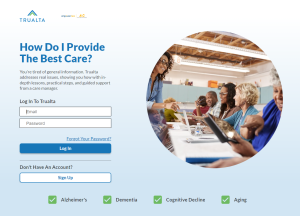How to recognize when you are a caregiver and find caregiver resources
 Do you find yourself helping out an adult who has a chronic or disabling condition? If so — whether you’re a family member, friend, or neighbor — you are a caregiver.
Do you find yourself helping out an adult who has a chronic or disabling condition? If so — whether you’re a family member, friend, or neighbor — you are a caregiver.
Maybe you’re raising a grandchild. If so, you’re a caregiver, too, and you can learn about specific resources to support you and your grandchild here.
Many people end up feeling overwhelmed with the responsibilities of caregiving. But you’re not alone. Whether you’re caring for your aging parent or supporting your adult child with a disability, Empowerline can help to relieve some of the burden and develop a better plan. Skilled specialists will ask you a few questions and help identify what solutions are best for you. They can recommend in-home services and other types of assistance, including services for individuals who would qualify for a nursing home but would rather live in their own homes or with their caregivers.
They can also connect you to support groups so that you can start to build a community with people who can understand and empathize.
Looking for more info? Read on.
Or, if you know what you are looking for already:
How did I become a caregiver?
Becoming a partner in the care of a loved one can be a gratifying and life-giving experience. But it often isn’t easy. Many didn’t ever expect to be in this role. Some adult children find themselves in difficult situations, as they may be called upon to care for parents with whom they have not spoken in years. Many caregivers face barriers such as a tight financial situation, especially if caregiving duties take time away from their job, or live several states away from their loved ones. In all of these scenarios, Empowerline can help.
Who is prone to caregiver burnout?
The short answer is everyone who is a partner in care is susceptible to burnout.
Being a caregiver of an older person or an individual with disabilities has no rulebook. Every situation is different, and there may be no end in sight to the stress and growing list of concerns. If an accident or illness occurs and lands your loved one in the hospital, you may suddenly find yourself speaking with a hospital discharge planner who asks you what your plan is, but you don’t have a clue. We’re here to help you navigate the options for both the long-term and the day-to-day care.
How to prevent caregiver burnout
Begin by understanding the conditions and needs of the person for whom you are caring. Understanding their condition will help you make informed, proactive decisions about the types of services they need now – or may need in the future.
Then, take a few minutes to write down all of your biggest concerns and identify what tasks and responsibilities are stressing you out. If you are able to identify your pain points, it will be easier to ask for help with specific challenges when accessing resources. Then, find support for yourself, like the resources at Empowerline listed on this page.
Caregiver support
To support yourself as a caregiver, you should adopt the oxygen-mask philosophy: take care of yourself before giving care to others.
While you are performing an immensely selfless service to your family members, it will be difficult to take care of them if you are not taking good care of yourself. If you overexert yourself trying to care for your loved one and live your own life at the same time, you risk:
- Draining your immune system and becoming sick yourself
- Facing depression and isolation
- Becoming very frustrated and short-tempered with the person for whom you are trying to care
If you are feeling stressed, reach out to the people around you. If your other family members, neighbors, and coworkers understand your situation, they may be able to offer help and understanding that makes a world of difference to you.
If you cannot get support from your friends and family, there are many other support options available to you. We can connect you to a variety of services that help with chores, errands, and additional supports or day services so that you can have a chance to take a break. Short-term services to give the caregiver a break are often referred to as respite care, which means giving you some relief, an opportunity to recharge or focus on other priorities.
Empowerline Service Tip Sheets
For more help with finding the right services, check out our tip sheets on Home Health Agencies and Adult Day Services.Your needs come first. How can we help you? Contact us today.
Free Trualta Caregiver Education Tool
Empowerline has partnered with Trualta to help family caregivers learn new skills to support themselves and their loved ones. Trualta’s free online educational tool helps caregivers learn about health issues, care techniques, and managing care for loved ones safely and confidently at home.






